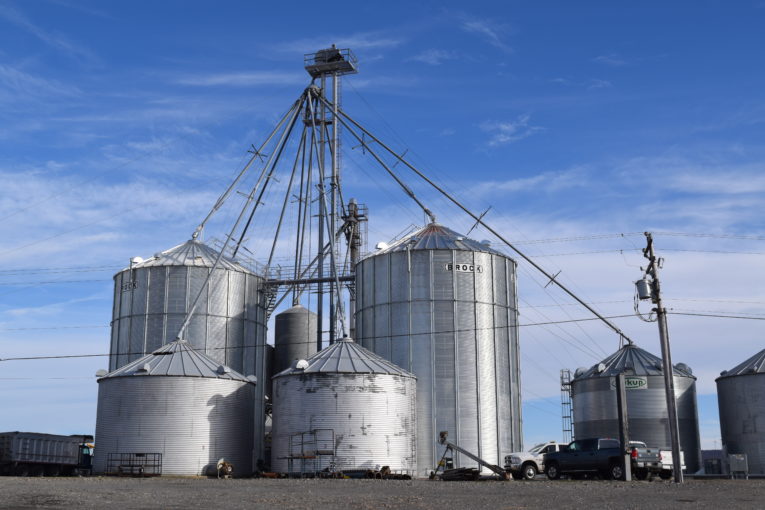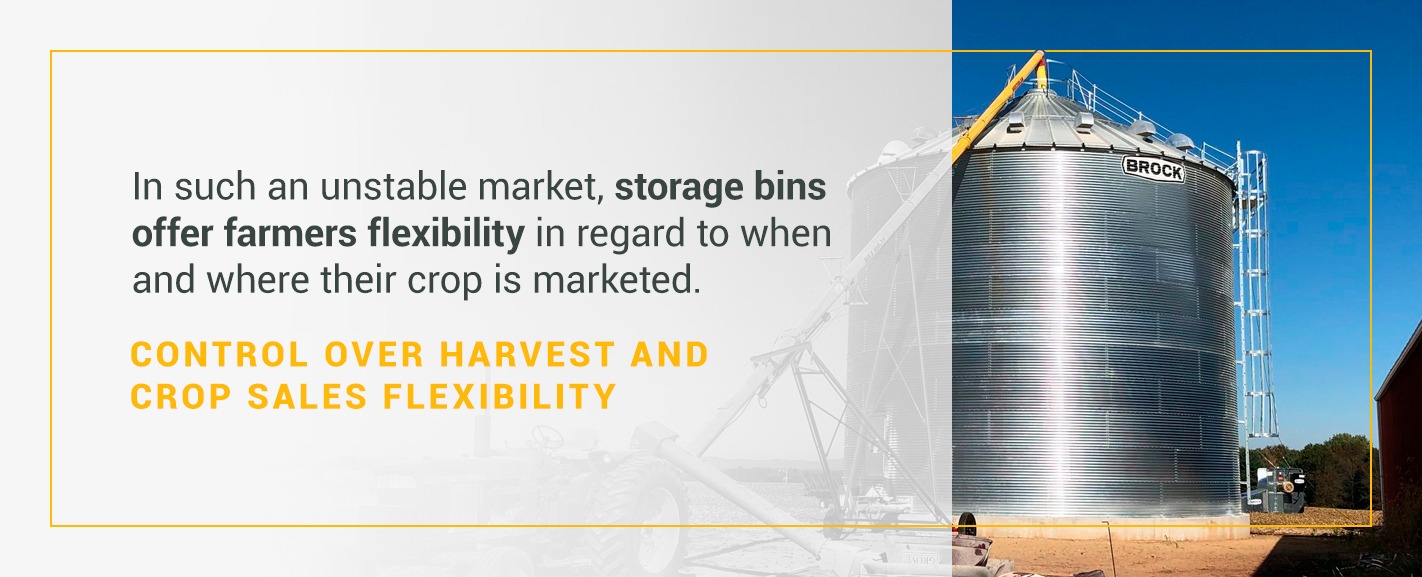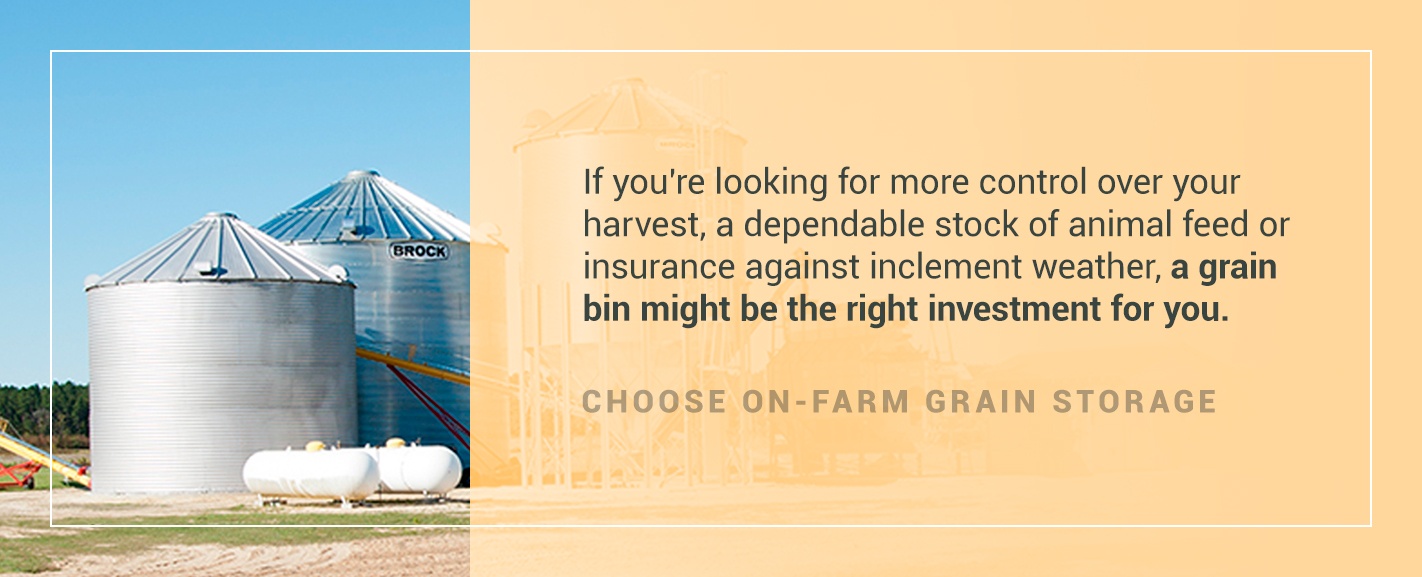What if there was a way to sell grain throughout the year when prices are highest? There is! And this reality is why on-farm grain storage is becoming more and more common. Farmers are turning to on-farm storage as a planned way to increase the chances of making money from their crops instead of simply crossing their fingers and hoping for the best each harvest.
To find out why so many farmers are opting to store grain themselves instead of commercially, this article will look at what benefits on-farm grain storage has to offer. From how storing grain can secure sales and contracts to why bulk animal feed is best, we’ll explore the advantages of storage in agriculture.
4 Benefits of On-Farm Grain Storage
Taking grain to a feed mill or elevator comes with extra charges for drying, shrink, storage, handling and more. Instead of paying these additional costs, many farmers prefer to store their grain on-farm and keep that money. On-farm grain storage is a viable alternative to commercial storage and comes with its own set of benefits. Grain bins are one of the best structures for storing dry grains on-farm but before making any decisions, it’s important to know what they bring to the table.
Here are the top four advantages to on-farm grain bins:
1. Maximize Financial Gain With Efficient Farm Storage
Of all the grain storage benefits, financial gain is one of the most significant. The point of storing your grain wisely is to turn a profit from it instead of risking it going to waste. On-farm grain storage bins allow small independent farmers to achieve this goal by helping them overcome market challenges.
Typically, around harvest is the worst time to sell grain because the high supply drives prices down. On-farm grain bins present a solution to this issue by enabling farmers to dry and store their surplus on-farm until the market is more profitable for selling — a strategy that can stabilize their income. With on-farm storage, farmers can know their grain is safe and well-preserved while they wait for prices to improve.
On-farm grain storage also helps counteract the high price of freight at harvest time. The demand for freight skyrockets during harvest, and the price rises with it. Holding grain on-farm after harvest instead of immediately transporting it allows farmers to wait for freight rates to drop or eliminate the cost of freight entirely by delivering grain directly to local receiving sites themselves.
2. Take Control Over Harvest and Sales Flexibility Through Grain Storage
The grain market is constantly fluctuating according to the price of inputs, weather, demographic changes, shifts in diet trends and other factors. In such an unstable market, storage bins offer farmers flexibility in regard to when and where their crop is marketed. On-farm grain storage can be a farmer’s greatest shield against unforeseen circumstances and uncontrollable variables.
Farmers can spread cash sales and grain delivery when they practice on-farm storage. Holding onto bushels postharvest allows farmers to secure a futures contract and guarantee a sale to help cover any costs from storing on-farm.
Greater market control can turn more cash flow into profitability. Storing grain on-farm gives a farmer greater control over their supply and direct management of their harvest, which means they get to decide exactly who to sell to instead of being limited to the local elevator. By storing grain in their own on-site bins, farmers can also choose the best fitting method of delivery at the time when delivery prices are lowest.
3. On-Farm Grain Storage Provides Year Round Animal Feed Supply
Of course, with grain stored on-farm, farmers can use it as needed throughout the year. Specifically, a large supply of stored grain can easily be used to feed animals as necessary. Because animal feed has a very short shelf-life, storing grain in bins for months and grinding it as needed is a cost-effective way to get fresh feed. Maintaining a steady stream of fresh feed will considerably boost the productivity of the animals, which is the ultimate goal.
Buying feed in bulk may seem like big cost savings, but its short storage life makes those savings equally as short-lived. Storing grain in bulk and then making feed fresh each week will help keep feed costs down and eliminate spoilage. By cutting out the price of delivery and significantly minimizing the risk of spoiled or poorly preserved feed, storing grain in an on-grounds grain bin greatly benefits the overall well-being of the farm.
4. Find Peace of Mind in Unpredictable Weather With Grain Storage
Even the best of farmers can’t predict the weather, but storage bins can help guard against any grain losses due to natural disasters. Even a light rain shower can harm crops by causing moisture damage, which is why drying is frequently used to preserve crops harvested at a higher moisture content. After drying, grain needs to be housed in a cool, aerated space to keep the grain in condition throughout the year. It’s convenient for a farmer to have an on-farm bin to transfer grain to immediately after it’s gone through drying, ensuring it’s protected from moisture damage — unlike it would be in an elevator pile. An in-bin drying system can also be installed in grain bins to condition higher moisture grains while storing them on-farm.
Grain bins also allow farmers to harvest early in the season and for longer throughout each day without needing to worry about when the mill receiving hours end. As opposed to storing at a grain elevator, having on-site storage allows continual harvest throughout the day. You’ll be able to skip the long lines at the grain elevator and use that valuable time to keep working in the field. Increasing the amount of grain harvested and stored on days the weather is suitable to work grants even better chances of reducing the amount of crop lost to weather. And on the days the weather is bad, bins will stand strong against the storm while the freshly harvested grain remains safe inside.
Why Choose On-Farm Grain Storage
On-farm grain storage can give a farmer financial benefits, greater control over where crops are sold, a hearty supply of animal feed and protection against weather damage. Ultimately, each of these advantages adds up to financial benefit and contribute to a profitable and flourishing farm. If you’re looking for more control over your harvest, a dependable stock of animal feed or insurance against inclement weather, a grain bin might be the right investment for you.
Contact TAM Systems for Grain Storage Solutions
To get the highest quality grain bin available, check out the bins from TAM Systems. At TAM, we offer several vented steel grain bin models, as well as custom designs, so you can find the perfect sized storage bin for your farm. Our bins are engineered to sustain tough weather and provide top-notch aeration so you’ll never have to worry about your grain getting ruined again.
Contact TAM today to get your free quote and start reaping the benefits of on-farm grain storage.




